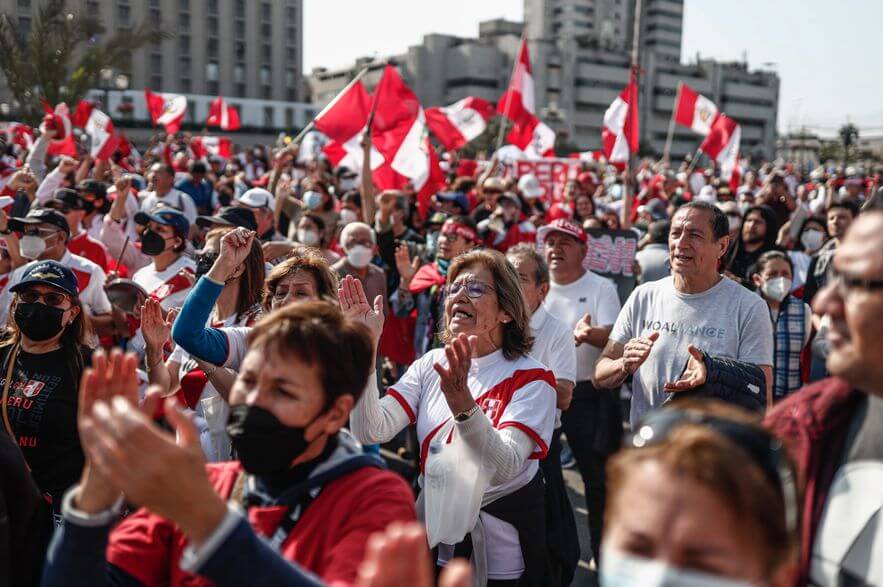On Saturday, over 5,000 people gathered in Lima with Peruvian flags and chanting anti-government slogans to demand the resignation of leftist President Pedro Castillo, who is under investigation for six criminal cases of corruption and plagiarism.
Conservative lawyer Lucas Ghersi, who was part of one of the organisers, Peru Reacts, noted, “We see a government involved in corruption and Congress doesn’t react.” Another protestor claimed that the government “is becoming hell” and wants to “become one more Venezuela,” referring to the South American country’s ongoing economic crisis. Similarly, a protestor named Carola Suarez asserted, “Peru can’t take it any more. We are on the edge of the precipice, economically everything has stagnated.”
The situation is tense in the streets of Lima in Peru after the attempt of demonstrators to force a cordon of police to reach the Congress. pic.twitter.com/Zrqs5AdWLp
— We Are Protestors (@WeAreProtestors) November 6, 2022
Riot police used tear gas to disperse the crowd as they started marching towards the parliament and the government palace. No injuries were reported.
Smaller protests were also held in other cities like Arequipa, Chiclayo, Cusco, and Trujillo.
Prior to the protests on Saturday, Castillo refuted all allegations of wrongdoing. “Today, they are trying to break us with disinformation, false accusations, and unimaginable slander so that we give up our will for change, which the country needs, and accept the power of those who do not want the humble. They do not want to see the poor, the citizens who face tremendous inequalities in Peru,” he asserted.
According to reports, over 10 tear gas bombs were used against protestors marching peacefully, which forced them to retreat and affected elderly people and merchants who were passing through the area.
— Gurbaksh Singh Chahal (@gchahal) November 6, 2022
The protests come against the backdrop of the imminent arrival of an Organization of American States (OAS) mission to the country on 20 November that will assess the political situation by speaking with government authorities, independent organisations, and members to civil society before preparing a report for the Permanent Council.
Castillo has been reeling under pressure due to increasing living costs, with the World Bank having predicted that the poverty levels will remain above pre-pandemic levels for the next two years.
Castillo has survived two impeachment attempts since coming to power last June—once last December and then earlier this year March. With his approval rating at an all-time low of 25%, Castillo admitted before the vote in March, “I am aware we all make mistakes and have defects, but I am loyal to my commitments, values and principles,” requesting the lawmakers to “vote for democracy, vote for Peru, vote against instability.”
Castillo has also faced internal strife after his prime minister, Anibal Torres, resigned in August due to a criminal investigation against the president.
Last month, Peruvian Attorney General Patricia Benavides filed a constitutional complaint against Castillo, accusing him of being a “perpetrator of crimes against the public peace in the form of a criminal organisation aggravated by his position as leader.” The right-wing opposition hopes that this will finally remove him from office. However, Castillo has denied breaking any laws, alleging his rivals of scheming to unseat him.
A los enemigos de siempre, que pretenden doblegarnos con desinformaciones, falsas acusaciones y calumnias, les digo que seguiremos trabajando para liberar al pueblo oprimido por las desigualdades, tal como nos lo enseñó nuestro cacique.
— Pedro Castillo Terrones (@PedroCastilloTe) November 5, 2022
According to Peru’s Constitution, the president enjoys immunity while in office and can only be prosecuted for treason, blocking Congress, or obstructing elections. Nevertheless, Peru is known for its history of impeaching presidents, having impeached three leaders so far; another two resigned before the vote could take place.
Meanwhile, a group of Castillo supporters also marched in Lima’s San Martin square. Castillo has denounced his opponents as “reactionaries” and “the enemies of people.”

